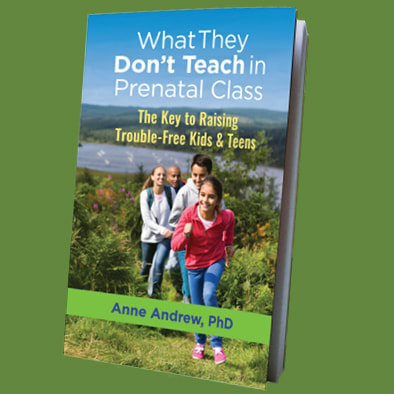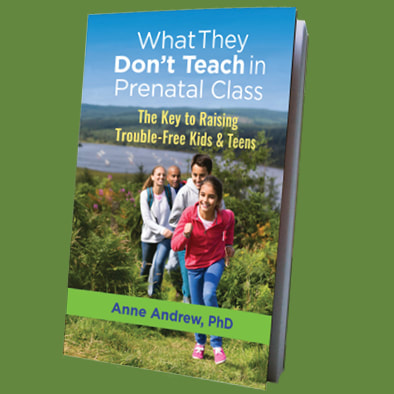|
At a time when anxiety and depression are rampant in our youngsters, helping them to understand their feelings can go a long way to relieving these debilitating problems.
Children do need to be allowed to feel their feelings and we can help our children to labeltheir feelings. However, we help them to understand where their feelings are coming from when we don’t validate them. In other words, it is OK for my child to feel angry when his best friend breaks his toy, but it’s best not to agree that the anger was because his friend broke his toy. We are never upset for the reason we think.
2 Comments
Why I wrote What They Don’t Teach in Prenatal Class: The Key to Raising Trouble-Free Kids and Teens1/25/2019 Note: My book is officially launching on February 13th, 2019 and there will be some bonus giveaways that day including free access to my online course (launching in May), worth $150.
My experience as a deeply troubled parent of a once troubled teenager (now a happily functioning adult), and my wish to help other parents avoid the sleepless nights, debilitating fear, helplessness, and despair, led me to write this book. Our family’s ordeal lasted more than six years, and during that time we learned strategies that not only helped us survive but actually allowed us to thrive. As we learned to cope with our family situation in the best way possible, we turned our lives around and emerged stronger, a closer family unit, with greater clarity, increased happiness, and a sense of joy that had not been present. Wow, I’m rapidly approaching the finish line with my book. In fact, the proof copy will have arrived by the time you read this! There are still a few glitches that will need straightening out, but we’re nearly there. My team has been amazing getting the editing, cover, interior layout and e-book conversion done so quickly. What a long process this has been!
By Anne Andrew (excerpted from her upcoming book What They Don’t Teach in Prenatal Class: The Key to Raising Trouble-Free Kids and Teens.)
One of the biggest causes of upsets for parents currently seems to be the battle over screen time. Studies show that too much screen time is not good for children, and screens need to be off for an hour or two before bedtime or sleep can suffer. Social media is adding stress to teens because of the need to be camera ready at all times and the huge potential for abuse. Policing screen time is an unwelcome but necessary chore for parents these days. Following my blog How to Raise Bully-Proof Children, one parent, who is familiar with the techniques I use, told of a bullying incident and how she handled it. It’s a wonderful example so I asked if I could share her story. I’ve changed the names to protect identities.
What if we really could raise children to be bully-proof – neither bullies nor victims? It must be worth a try.
What if we’ve got the bully / victim story completely wrong? This blog presents a radically different solution. In this blog, I’ll explain the root causes of bullying and why punishing the bully and commiserating with the victims actually makes matters worse. I’ll show what both bullies and victims gain from their experience, and suggests five strategies for parents and teachers that will help raise children who are less likely to be bullies and unlikely to be picked on as victims. |
Author I know firsthand the emotional and financial costs of having a troubled teenager and I don’t want that to happen to you. That's why I wrote my book What They Don't Teach in Prenatal Class: The Key to Raising Trouble-Free Kids and Teens (available on Amazon). Archives
April 2022
Categories
All
|
get in touch
Email: [email protected] Tel: (1) 604 720 2776
Sign Up to my newsletter
Get information and articles about how to raise happy, mentally-healthy, and addiction-free kids!







 RSS Feed
RSS Feed